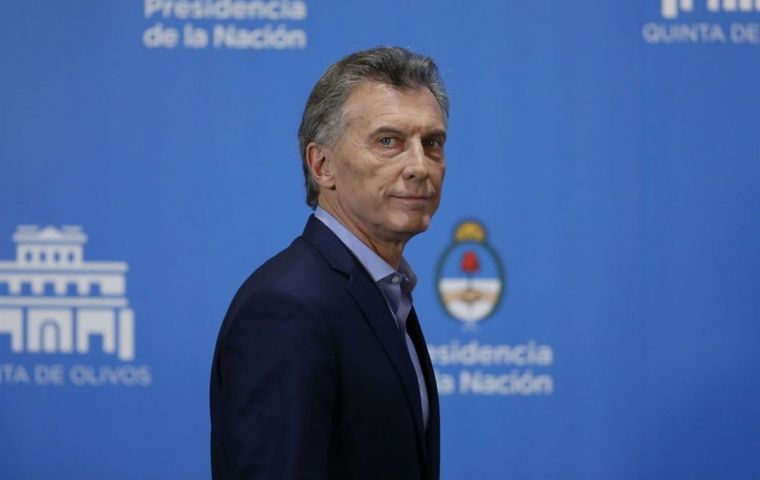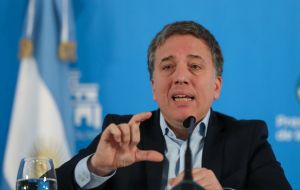MercoPress. South Atlantic News Agency
Macri announces freeze in the price of basic goods and in public services
 The Macri government has committed to not increasing the price of public services such as transport, gas and electricity for the rest of the year.
The Macri government has committed to not increasing the price of public services such as transport, gas and electricity for the rest of the year.  “It's a difficult time for Argentine families. March and April have abnormally high levels of inflation due to the unstable exchange rate” said Minister Nicolas Dujovne
“It's a difficult time for Argentine families. March and April have abnormally high levels of inflation due to the unstable exchange rate” said Minister Nicolas Dujovne Argentina's President Mauricio Macri announced a freeze in the price of basic goods and public services on Wednesday in a bid to limit the impact of spiraling inflation that could hamper his re-election hopes in October. Hit by soaring prices due to inflation that reached almost 55% over the last 12 months, many Argentines have been calling for a change in economic policy.
“It's a difficult time for Argentine families. March and April have abnormally high levels of inflation due to the unstable exchange rate,” said Finance Minister Nicolas Dujovne.
“We're convinced we're going to win the battle against inflation,” he added.
The government has committed to not increasing the price of public services such as transport, gas and electricity for the rest of the year.
Added to that, it has agreed with businesses to a freeze on the prices of 60 basic products, including meat, for at least six months.
The country's 18 million pensioners and people receiving state subsidies will benefit from price reductions and credit in those businesses.
Last year, under pressure from the International Monetary Fund (IMF), which agreed to a US$ 56 billion loan, the Argentine government launched an austerity plan to try to reduce the state deficit.
“Given the exchange rate has started to stabilize, we think the time has come to offer a bit of relief to Argentines, who have made so many efforts these last few months that have been so difficult for everyone,” said a government statement.
Since assuming office in December 2015, Macri has steered the country away from the leftist policies of his predecessor Cristina Kirchner. The fight against inflation has been his main priority.
In March alone, prices rose by 4.7% in Argentina. The population has suffered a dramatic drop in purchasing power over the last 12 months. Their problems were exacerbated by a currency crisis that saw the peso lose half its value against the dollar in 2018. Since the start of 2019, it has already lost another nine percent.
“We remain convinced that to reduce inflation in the long-term, and to end this problem we've been suffering from for 75 years, the profound and structural changes we've committed to these last few years are indispensible,” said the government statement.
On Tuesday, the central bank announced a new measure, approved by the IMF, to prevent another currency crash. It fixed a maximum exchange rate of 51.45 pesos to the dollar -- Tuesday's figure was 43.38.
Upper and lower limits, which gradually increased every month, had already been set in a bid to avoid damaging wild fluctuations.
The government says the depreciation of the peso is the primary factor driving inflation, while soaring prices could prove the biggest obstacle to Macri's re-election.
“These measures have been announced because there's an election at the end of the year and the president is hoping for a second term,” said political analyst Ignacio Zuleta.
“The aim is to show that the government is trying to resolve the population's problems.”
Despite Argentina's economic woes, Macri still heads the polls, although his nearest challenger Cristina Fernandez de Kirchner has troubles of her own, embroiled in more than 10 separate corruption investigations.




Top Comments
Disclaimer & comment rules-

-

-

Read all comments“We're convinced we're going to win the battle against inflation,”
Apr 18th, 2019 - 01:34 pm 0From what little snippet of fiscal data did you arrive at that certainty?
Fancy, hollow, election year verbage.
This kind of politician bull-dung is even easier for a pol to throw out than a campaign “promise”. Even these guys don't dare to promise things about better inflation.
Freezing prices won't work....the day you free them, repressed inflation will take off again....just need to see what happened in Brazil in 1986 (“Plano Cruzado”, under Sarney).
Apr 20th, 2019 - 03:39 pm 0EM
Apr 21st, 2019 - 10:01 pm 0“....the Argentine president decided to temporarily “alleviate” the needs of Argentines with measures more identified with Kirchnerist governments....”
Sounds like an admission that you agree Kirchners also pissed out the pot....
Commenting for this story is now closed.
If you have a Facebook account, become a fan and comment on our Facebook Page!